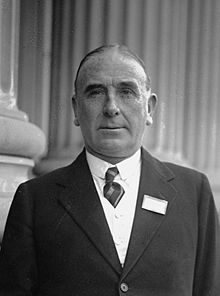Robert Horne, 1st Viscount Horne of Slamannan
Robert Stevenson Horne, 1st Viscount Horne of Slamannan PC ( February 28, 1871 - September 3, 1940 ) was a British university professor , lawyer and politician of the Scottish Unionist Party who between 1918 and 1937 the constituency of Glasgow Hillhead in the House of Commons represented and served in the coalition government of Prime Minister David Lloyd George successively from 1919 to 1920 Minister of Labor, from 1920 to 1921 Minister of Commerce and most recently from 1921 to 1922 Chancellor of the Exchequer . In 1937 he was raised to the hereditary nobility as Viscount Horne of Slamannan and was a member of the House of Lords until his death in 1940 .
Life
Lecturer, lawyer and First World War
Horne was the son of clergyman Robert Stevenson Horne and his wife Mary Lockhead and began after attending George Watson's College to study law at the University of Glasgow , which he obtained with a Bachelor of Laws (LL.B.). Another thereat postgraduate studies of philosophy , he finished with a Master of Arts (MA) and took 1,895 first a job as a lecturer of philosophy at the University College of North Wales in Bangor on before it after his admission to the Bar in 1896 Scotland an activity recorded as a barrister . Besides his legal practice, he served from 1896 to 1900 also as an examiner in philosophy at the University of Aberdeen and was for his lawyer's merits 1910. Attorney (King's Counsel) appointed.
During the First World War Horne did his military service with the Royal Engineers and was most recently promoted to lieutenant colonel. For his services he was made Knight Commander of the Order of the British Empire (KBE) in 1918 and from then on carried the title " Sir ".
Member of the House of Commons and Minister
As a candidate for the Scottish Unionist Party, Horne was elected to the House of Commons for the first time on December 14, 1918 and represented the constituency of Glasgow Hillhead until May 25, 1937 . Immediately afterwards he took over in the government of the list of British Prime Ministers David Lloyd George in 1918 his first government office and served until 1919 as Third Lord of the Admiralty (Third Lord of the Admiralty) .
On January 10, 1919 he was appointed by Prime Minister Lloyd George to succeed George Henry Roberts as Minister of Labor in his government and held this ministerial office until he was replaced by Thomas James Macnamara on March 19, 1920. At the same time he was appointed a member of the Privy Council (PC) in 1919. He then took over as part of a cabinet reshuffle on March 19, 1920 from Auckland Campbell-Geddes, the office of Minister of Commerce (President of the Board of Trade ) , which he held until April 1, 1921.
As part of a further cabinet reshuffle, Horne, who had been promoted to Knight Grand Cross of the Order of the British Empire (GBE) in 1920, was appointed Chancellor of the Exchequer by Prime Minister Lloyd George on April 1, 1921 , and thus succeeded Austen Chamberlain while Stanley Baldwin succeeded him as Secretary of Commerce. As Chancellor of the Exchequer, he remained in office until the end of Lloyd George's tenure on October 19, 1922, and as such also held the position of Lord High Treasurer . One of his closest associates as Chancellor of the Exchequer was his Parliamentary Private Secretary, Frederick Thomson .
House of Lords
In addition to his government offices, Horne took over from Weetman Pearson, 1st Viscount Cowdray in 1921 , as rector of the University of Aberdeen, which he held until he was replaced by Robert Cecil, 1st Viscount Cecil of Chelwood in 1924. He was also in 1934 CEO of the railway company Great Western Railway .
After his departure from the House of Commons on May 25, 1937, Horne was raised to the hereditary nobility of the Peerage of the United Kingdom by a letters patent dated June 9, 1937 as Viscount Horne of Slamannan , of Slamannan in the County of Stirling , and belonged as such as a member of the House of Lords until his death. When necessitated by his departure from the lower house election (by-election) was James Scot Cumberland Reid elected to succeed him as MP.
Since Viscount Horne of Slamannan died without heirs, the title of nobility expired with his death.
Web links
- Robert Horne, 1st Viscount Horne of Slamannan at Hansard (English)
- Entry in Cracroft's Peerage
- Entry in Leigh Rayment Peerage
- Robert Stevenson Horne, 1st Viscount Horne of Slamannan on thepeerage.com , accessed August 19, 2015.
Individual evidence
- ↑ The London Gazette : No. 34408, p. 3856 , June 15, 1937.
| predecessor | Office | successor |
|---|---|---|
| New title created | Viscount Horne of Slamannan 1937-1940 |
Title expired |
| personal data | |
|---|---|
| SURNAME | Horne, Robert, 1st Viscount Horne of Slamannan |
| ALTERNATIVE NAMES | Horne, Robert Stevenson, 1st Viscount Horne of Slamannan (full name) |
| BRIEF DESCRIPTION | British Conservative Party politician, House of Commons member and peer |
| DATE OF BIRTH | February 28, 1871 |
| DATE OF DEATH | September 3, 1940 |
